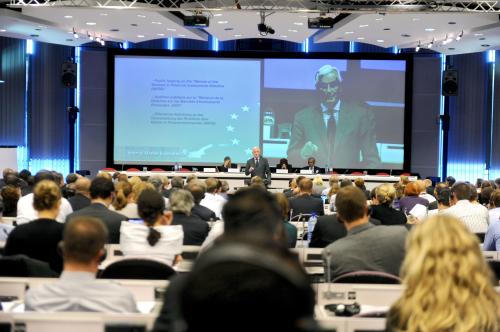
Seminar to curb food speculation
Banks, hedge funds and pension funds are betting on food prices in the financial markets, causing drastic price swings in staple foods such as wheat, maize and cocoa. Heavy lobbying from the financial world is undermining strict regulation to curb this financial speculation on food. On 20 September SOMO co-organised a training and strategy seminar in Brussels for capacity building of NGOs to curb speculation in food. Also on 21 September, SOMO spoke at the hearing of the European Commission on commodity and energy derivatives. More civil society organisations willing to engage in this debate are welcome to join.
From September this year and well into next year, food speculation will be on the political agenda in the European Union, both as part of broader attempts to regulate derivatives and as a special issue. It remains to be seen whether the outcome will be new regulation that curbs the kind of speculation that proved so disastrous in 2008 when millions of people were victim of skyrocketing prices on basic food stuff. That provides dangerous volatility when combined with events such as recent wheat harvest problems and price rises.
How food speculation originated
Historically, ‘futures contracts’ were created in US financial markets to help farmers and food processors to deal with the uncertainty of growing crops (such as unforeseen weather conditions). A futures contract enables end-users to buy crops at a future date at a guaranteed price. However, these contracts can also be bought and sold by bankers who have little or no involvement in the actual food being traded but bet on food prices, to make money.
During 1990s and early 2000s, aggressive lobbying by US bankers led to weaker regulations over food speculation. New and complicated financial products were created to allow more ways to make money from betting on food. Banks such as Goldman Sachs created special index funds to help hedge funds and other financial companies make money from food prices, just like they do from share prices.
While bankers are reaping huge profits from betting on food prices, farmers are affected by volatility and poor people across the world are paying the price when prices spike. The years 2007–2008 saw dramatic increases in food commodity derivative speculation which resulted in high and sudden rises in world food prices, creating a global crisis and causing political and economical instability and social unrest in both poor and developed nations. The prices fell dramatically when speculators withdrew from derivative trading once the financial crisis erupted in Autumn 2008.
Joint pressure on regulation in the EU
Since 2008 the European Commission (EC) has launched investigations into the food price crisis and financial regulation, regarding derivatives and alternative investment funds. These are to be followed by proposals for new EU directives in these fields in Autumn 2010.
Whether these proposals will be converted to new strict regulation depends among other things on the pressure civil society organisations are able to mount on the Commission, governments, the European Parliament and other politicians. Together with other European NGOs, SOMO organised a training and strategy seminar on 20 September in Brussels for civil society organizations that want to get involved with advocacy and campaigning against financial speculation on food. The seminar was organised by WEED, WDM, Corporate Europe Observatory, SOMO, CRBM, IATP, Re-define
On 21 September the European Commission organised a hearing on commodity and energy derivatives, before it proposes new rules to rein in excessive speculation through food derivatives. Myriam Vander Stichele (SOMO) was one of the only two representatives of civil society organisations speaking at the hearing. NGOs call for different measures to prevent financial speculators having negative impacts on food prices. The EC Commissioner Barnier admitted that food speculation is scandalous, and that rigid rules are absolutely essential in preventing another food price crisis. However, the hearing was full of speakers and participants from big business and financial speculation companies who called for as little regulation as possible, even denying that their speculation has an impact.
A report of the hearing can be requested at SOMO. More civil society organisations willing to engage in this debate are welcome to contact Myriam Vander Stichele.
More information on the seminar and programme >(opens in new window)
Download power point SOMO speech on EC hearing on 21 September >(opens in new window)
sources:
Related news
-

-
Why share buybacks are bad for the planet and peoplePosted in category:Opinion
 Myriam Vander StichelePublished on:
Myriam Vander StichelePublished on: Myriam Vander Stichele
Myriam Vander Stichele -
Hungry for profits Published on:
 Vincent KiezebrinkPosted in category:Publication
Vincent KiezebrinkPosted in category:Publication Vincent Kiezebrink
Vincent Kiezebrink


